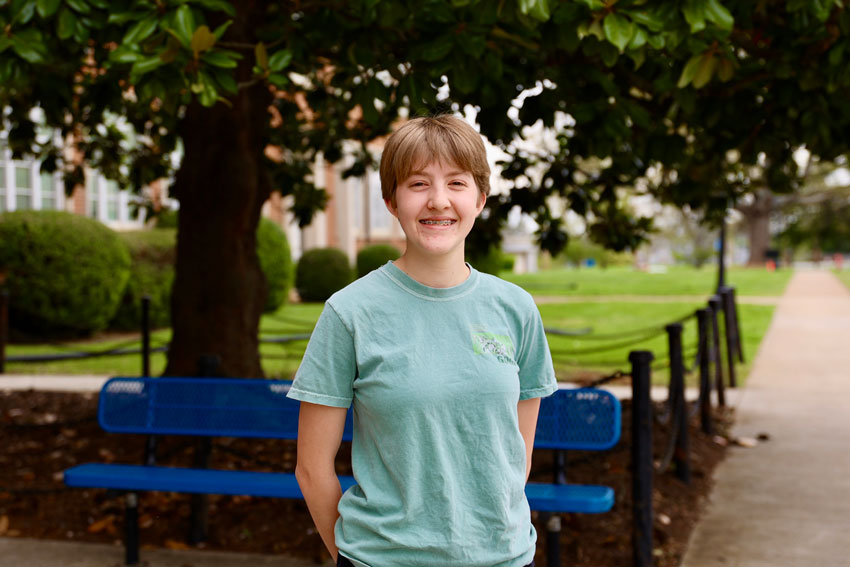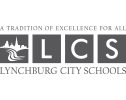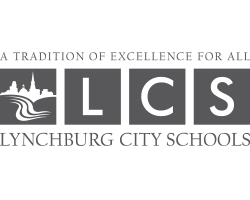Three Lynchburg City Schools (LCS) students represented the Central Virginia region at the highly competitive Virginia State Science & Engineering Fair (VSSEF) at Old Dominion University on April 12-13. Each earned a spot in the state competition after excelling at the regional fair in March against public and private school students from Amherst County, Appomattox County, Bedford County, Campbell County, and the city of Lynchburg.
Among the state competitors was E. C. Glass High School and Central Virginia Governor’s School (CVGS) eleventh grader Lindley Crosby, who was named the Grand Award Finalist in Biological Sciences after the regional competition. Crosby is one of just two students selected to represent Central Virginia at the Regeneron International Science and Engineering Fair (ISEF) from May 12-17 in Los Angeles, California. Their project, entitled “The Effect of Agricultural Pesticide on the Early Growth and Development of Zea mays,” tests the effects of pesticides on early-stage corn growth.

Crosby sprouted corn seedlings in plastic bags and measured the effects varying concentrations of pesticides had on their germination over the course of one week. They had hypothesized that the seedlings exposed to the most pesticides would grow the slowest, but their conclusion surprised them. The seedlings’ growth gradually increased as the concentration of pesticides increased.
“A lot of times with research, you’ll be surprised by the results, which can be the opposite of what you expected,” Crosby said. “My results seem to imply that pesticides could be conducive to plant growth.”
But this conclusion isn’t a green flag to declare agricultural pesticides a boon for plant growth, Crosby explained. Though the results are meaningful, they would necessitate larger-scale testing to be universalized.
“If there’s one thing I’ve learned about research, it’s that you can’t ever prove anything, because there's always more data to find and more research to be done. Even if pesticides do speed up early plant growth, that’s not their intended purpose,” Crosby said.
In fact, Crosby noted, pesticides can cause undue harm to humans and the environment. Their distrust of pesticides prompted them to choose this topic for their project. A review of the existing literature on the subject affirmed their suspicions; pesticide drift from farms can increase local community members’ risk of chronic illnesses, neurological disorders, pesticide poisoning, and other ailments. People in the Global South are particularly at risk due to more relaxed regulations on pesticide use, Crosby explained.
“I chose to focus my research on pesticides because environmental issues are something I’m passionate about. A love for nature and the outdoors is something my parents imbued in me at a young age,” said Crosby, whose dad is an engineer and mom is a forestry major-turned-nurse. “Growing up, they always encouraged me to think deeper and ask questions.”
After high school, Crosby aspires to become an environmental scientist after studying marine and environmental sciences at the U.S. Coast Guard Academy. They’ve had opportunities to explore their passion for science at CVGS through projects like this one as well as their current internship with BWX Technologies, Inc., where they’re shadowing two environmental scientists to learn about their work firsthand. Both scientists are CVGS graduates, a fact Crosby particularly appreciates.
“I have a passion for learning in general. I really enjoy it. It’s what pushed me to go to governor’s school. It’s a lot of hard work, but the supportive learning environment, great teachers, and unique opportunities are worth it,” Crosby said.
All CVGS students were required to conduct an experiment for the regional fair, and Crosby approached theirs from a place of curiosity rather than competition. Crosby’s nomination as the division’s sole ISEF finalist was a complete surprise to them.
“I went in not expecting to win anything. I wasn’t there for the competition. I was just passionate about my project. I love telling people about what I had the opportunity to do for this experiment,” Crosby said. “It’s an honor to be able to have this experience and represent LCS on an international level.”
The state competition served as practice for Crosby’s ISEF presentation. As May 12 approaches, Crosby is eager to share their findings on the international stage.
The following LCS CVGS students won awards at the regional science fair:
Central Virginia Regional Science Fair (CVRSF) Award Winners
Grand Award ISEF Finalist: Biological Sciences
Lindley Crosby, E. C. Glass High School (ECG)
“The Effect of Agricultural Pesticide on the Early Growth and Development of Zea mays.”
VSSF Finalists
These students advanced to the state competition.
Calvin Guo, Heritage High School (HHS)
Linus Putnam, ECG
Lindley Crosby, ECG
Category Winners
Energy and Transportation
1st place: Calvin Guo, HHS
Honorable mention: Amorie Dop, ECG
Engineering
2nd place: Linus Putnam, ECG
3rd place: Sebastian Ploch, ECG
Mathematics
2nd place: Jonathan Herrick, ECG
3rd place: Griffin Quinones-Partain, HHS
Medicine and Health
Honorable mention: Berkley Milam, ECG
Plant Sciences
1st place: Lindley Crosby, ECG
Honorable mention: Meraal Zahra, HHS
Special Awards
ASCE Local Engineering Awards
2nd place: Jack Schrader, ECG
U. S. Stockholm Water Prize Nominations
1st place: Emily Judy, HHS
Virginia Lakes & Water Sheds Association
Olawande Oluwaji, ECG

